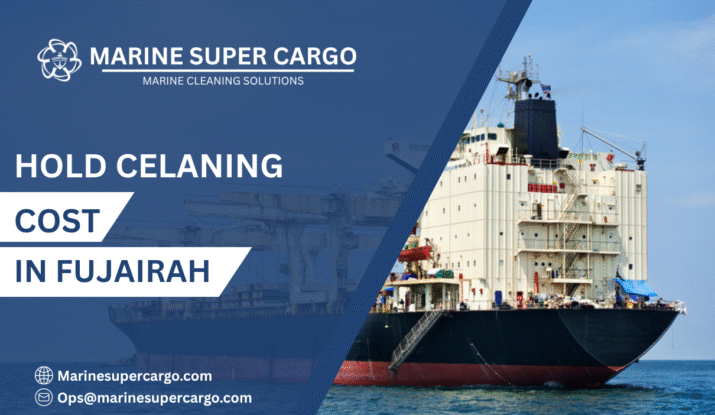Fujairah, located on the eastern shoreline of the United Arab Emirates (UAE), stands as a major maritime center in the region. Its prime position along key international shipping routes has established Fujairah Port as one of the busiest and most significant ports in the Middle East, providing an extensive range of hold cleaning costs in Fujairah for the shipping industry.
A vital service that ensures the efficiency of maritime operations in this hub is hold cleaning. This process guarantees that vessel cargo holds are thoroughly cleared of contaminants, residues, and impurities, making them ready and safe for the next cargo load.
This article explores the key factors affecting hold cleaning costs, outlines standard cleaning operations, examines pricing, and provides actionable tips for optimizing expenses. Whether you operate oil tankers, bulk carriers, or container ships, this guide will help you make informed decisions about comprehensive hold cleaning services.
Why Hold Cleaning is Critical for Vessels Operating in Fujairah Port
Hold cleaning is more than a regulatory requirement—it ensures operational efficiency, cargo safety, and compliance with international shipping standards.
- Cargo Integrity: Residues from previous cargo can contaminate new shipments, especially for sensitive bulk materials such as grains, cement, or chemicals. Proper hold cleaning services prevent contamination and safeguard cargo quality.
- Regulatory Compliance: International maritime and environmental standards, such as IMO and MARPOL regulations, require strict adherence to cleaning protocols. Failure to comply can result in fines, delays, or cargo rejection by port authorities.
- Operational Efficiency: Clean holds facilitate faster turnaround times, enabling ships to meet tight schedules and reduce port delays. Proper cleaning operations also minimize additional operational costs for demurrage and overtime labor.
Key Factors Influencing Hold Cleaning Costs in Fujairah
Several factors determine the overall cost of hold cleaning in Fujairah, and understanding them helps ship operators budget effectively.
- Cargo Type and Residue Complexity
- Residue from heavy bulk cargoes like cement or coal requires extensive cleaning compared to general cargo.
- Oil tankers may require specialized high-pressure water jets and chemical treatments.
- Cleaning methods, manpower, and time are all influenced by cargo complexity.
- Residue from heavy bulk cargoes like cement or coal requires extensive cleaning compared to general cargo.
- Vessel Size and Hold Configuration
- Larger vessels, including bulk carriers and container ships, naturally incur higher cleaning costs due to the increased volume of holds.
- Multi-deck holds or complex layouts demand more cleaning equipment and labor hours.
- Larger vessels, including bulk carriers and container ships, naturally incur higher cleaning costs due to the increased volume of holds.
- Cleaning Methodology
- Manual cleaning is necessary in corners and confined spaces but increases labor costs.
- Mechanical methods, such as high-pressure water jets, expedite the process and reduce labor time.
- Many providers offer hybrid approaches for cost-effective, thorough comprehensive cleaning.
- Manual cleaning is necessary in corners and confined spaces but increases labor costs.
- Compliance with Port and International Standards
- Following MARPOL and IMO regulations ensures environmentally safe cleaning operations.
- Compliance may require specialized equipment and certified hold cleaning services, which affect pricing.
- Following MARPOL and IMO regulations ensures environmentally safe cleaning operations.
- Port Tariffs and Service Charges
- Fujairah Port applies fees based on Gross Tonnage (G.T.) and vessel type.
- Extra services such as waste disposal, chemical treatment, or specialized cleaning for hazardous cargo may add to the overall operational cost.
- Fujairah Port applies fees based on Gross Tonnage (G.T.) and vessel type.
Standard Bulk Carrier Hold Cleaning Procedure
Understanding the cleaning workflow helps optimize both cost and operational efficiency:
- Pre-Cleaning Assessment
- Inspect the holds to identify residue type and volume.
- Determine necessary cleaning equipment and chemicals.
- Inspect the holds to identify residue type and volume.
- Cleaning Execution
- Utilize mechanical cleaning with high-pressure water jets for most bulk residues.
- Manual scrubbing may be necessary in hard-to-reach areas.
- Hull cleaning may be conducted simultaneously for efficiency.
- Utilize mechanical cleaning with high-pressure water jets for most bulk residues.
- Post-Cleaning Inspection
- Verify that holds meet international shipping cleanliness standards.
- Provide certification for compliance with MARPOL and port authorities.
- Verify that holds meet international shipping cleanliness standards.
Tips to Reduce Hold Cleaning Expenses
Optimizing cleaning costs does not mean compromising on quality. Specialized services and proactive strategies can save both time and money:
- Pre-Cleaning Coordination: Work with previous cargo operators to minimize residue complexity.
- Routine Maintenance: Schedule interim cleanings to prevent residue buildup, reducing intensive cleaning requirements.
- Hire Experienced Service Providers: Engage hold cleaning services familiar with Fujairah Port and international shipping regulations.
- Select the Right Cleaning Method: Use high-pressure water jets and mechanical equipment for suitable cargo types.
- Integrate Hull Cleaning and Tank Cleaning: Combining cleaning operations for multiple areas of the vessel can improve operational efficiency.
Conclusion
For vessels operating in Fujairah Port, understanding bulk carrier hold cleaning costs is critical to efficient maritime operations. Cost drivers include cargo type, vessel size, cleaning methodology, and compliance with port and international standards.
By planning cleaning schedules, hiring experienced hold cleaning services, and using specialized cleaning equipment, ship operators can maintain high operational efficiency while managing operational costs.
Partnering with trusted providers ensures compliance with international maritime regulations, safe handling of residues, and faster turnaround times.
For reliable and comprehensive cleaning solutions, request a hold cleaning quote in Fujairah today and optimize your vessel’s operational efficiency.
FAQ Section
1. How long does bulk carrier hold cleaning take in Fujairah?
- Typically 24–48 hours depending on vessel size and cargo residues.
2. Are hazardous cargo residues more expensive to clean?
- Yes, specialized procedures, chemicals, and safety measures increase costs.
3. Can regular maintenance reduce overall cleaning expenses?
- Absolutely. Routine interim cleanings prevent residue buildup, minimizing labor and equipment use.
4. Are mechanical cleaning methods more efficient than manual cleaning?
- Yes. Mechanical methods, including high-pressure water jets, reduce cleaning time while maintaining quality.


